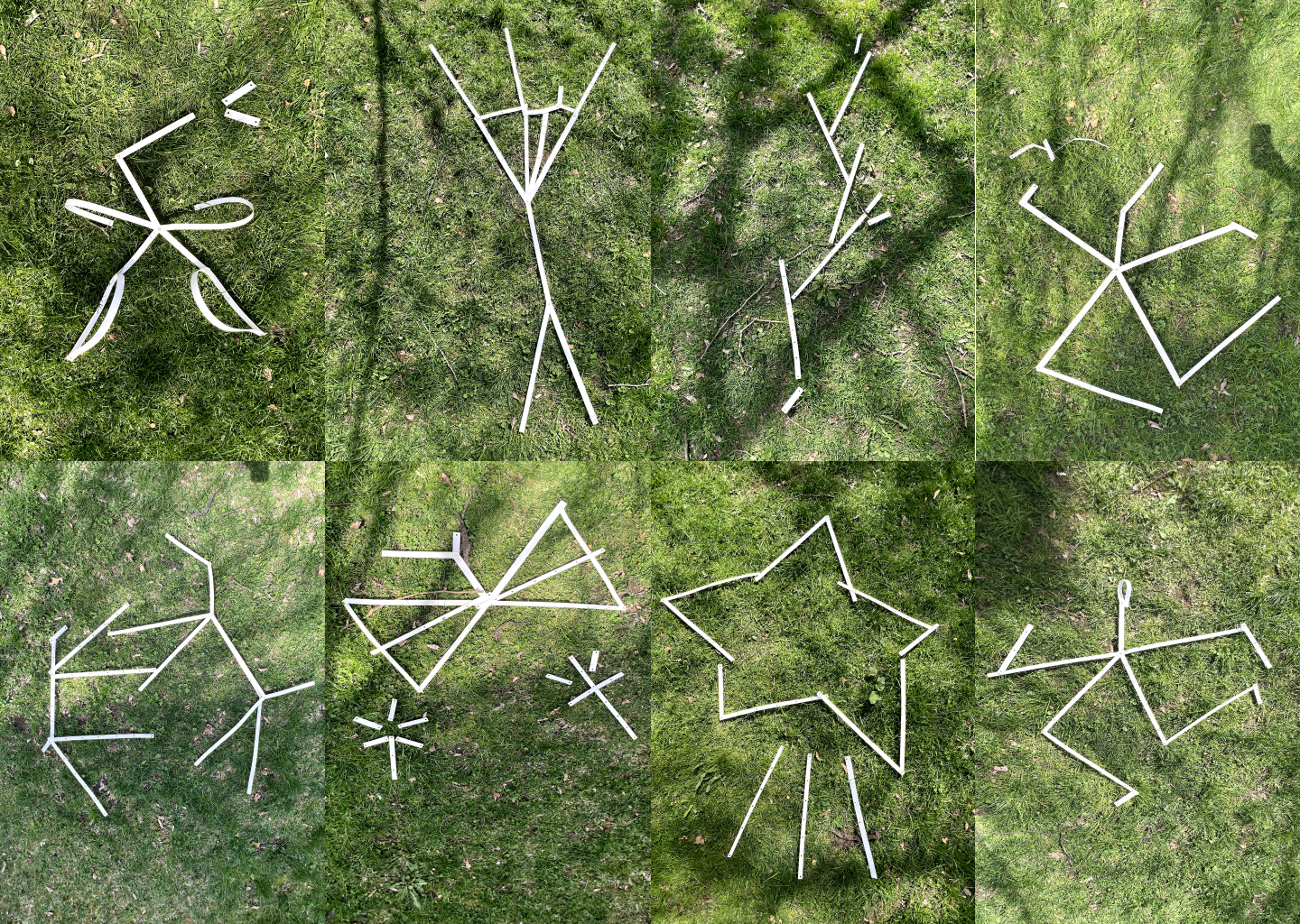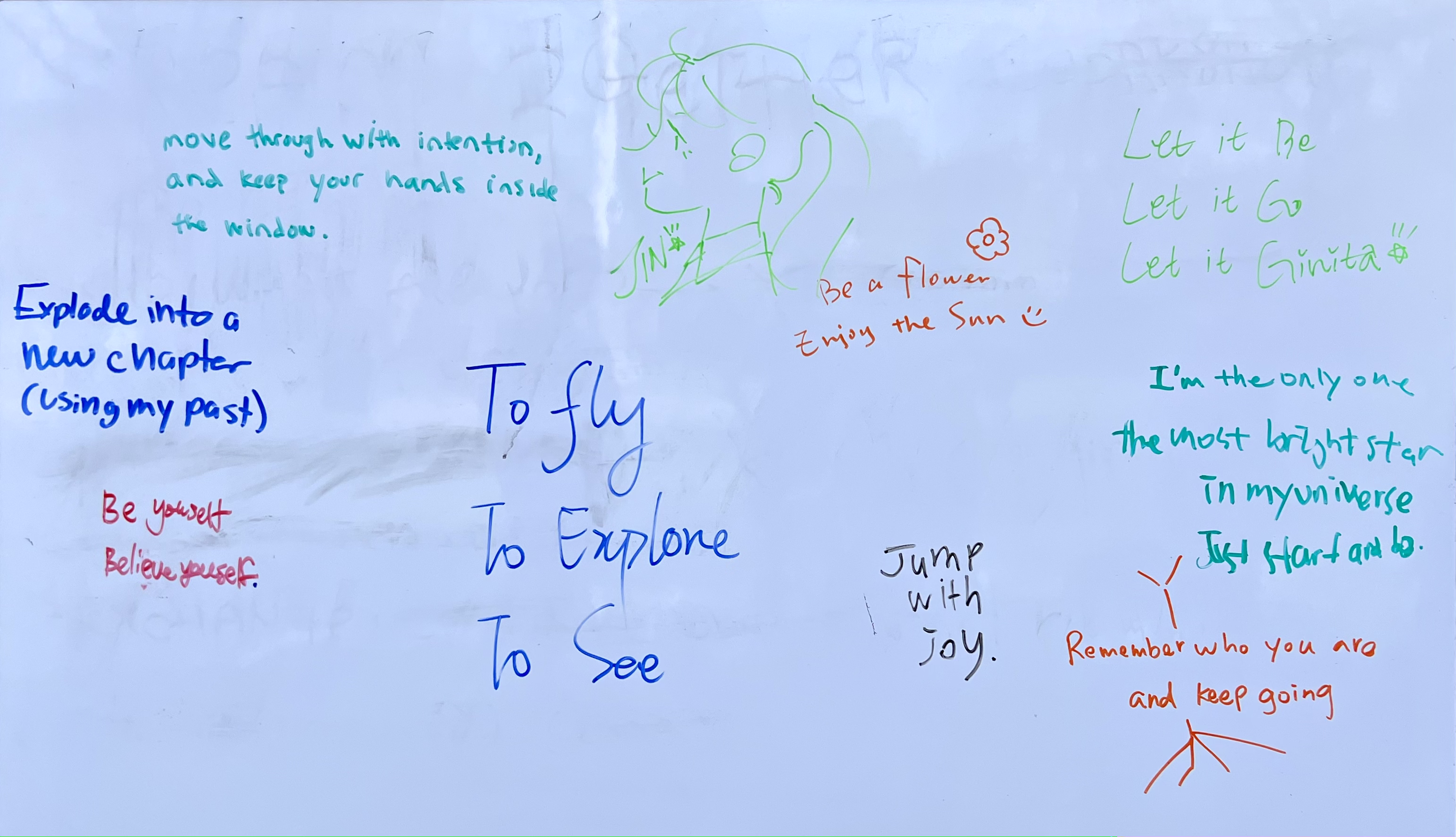What’s Your Dream series: Posing 2gether workshop
Download PDF ︎
Duration:
1 hours
Learning context:
“The role of imagination is not to resolve, not to point the way, not to improve. It is to awaken, to disclose the ordinarily unseen, unheard, and unexpected.“ — Maxine Greene, Releasing the Imagination: Essays on Education, the Arts, and Social Change.
What’s Your Dream: Posing 2gether is a 1-hour workshop taught at Pratt Institute. While facing their graduation, students are working on professionalizing their works and portfolios, to figure out their trajectory. This workshop aims to lead students to rethink their relations with their careers.
Based on research on self-determination theory, meaningful work is a critical element of the positive functioning of employees, but what makes work meaningful? Four psychological satisfactions substantially influence work meaningfulness across cultures: autonomy (sense of volition), competence (sense of efficacy), relatedness (sense of caring relationships), and beneficence (sense of making a positive contribution). What’s Your Dream series workshops start by exploring relatedness and selves through tangible objects and combining them with the professionalization in the course. This workshop aims to clarify and remind students of their meaningfulness in their 2-year learning process and speculates and reveals their potential selves and roles in their careers.
The participants will think about the following:
- As a human, what is my priority in my current life?
- As a learner, what I’ve learned in the design graduate program?
- As a designer, what is my life purpose, and what value do I want to support through my design?
- How to empower our personalities and personhoods in future careers and workspaces?
- How can we support each other as allies and friends, and what are the potential ways to collaborate?
Download PDF ︎
Duration:
1 hours
Learning context:
“The role of imagination is not to resolve, not to point the way, not to improve. It is to awaken, to disclose the ordinarily unseen, unheard, and unexpected.“ — Maxine Greene, Releasing the Imagination: Essays on Education, the Arts, and Social Change.
What’s Your Dream: Posing 2gether is a 1-hour workshop taught at Pratt Institute. While facing their graduation, students are working on professionalizing their works and portfolios, to figure out their trajectory. This workshop aims to lead students to rethink their relations with their careers.
Based on research on self-determination theory, meaningful work is a critical element of the positive functioning of employees, but what makes work meaningful? Four psychological satisfactions substantially influence work meaningfulness across cultures: autonomy (sense of volition), competence (sense of efficacy), relatedness (sense of caring relationships), and beneficence (sense of making a positive contribution). What’s Your Dream series workshops start by exploring relatedness and selves through tangible objects and combining them with the professionalization in the course. This workshop aims to clarify and remind students of their meaningfulness in their 2-year learning process and speculates and reveals their potential selves and roles in their careers.
The participants will think about the following:
- As a human, what is my priority in my current life?
- As a learner, what I’ve learned in the design graduate program?
- As a designer, what is my life purpose, and what value do I want to support through my design?
- How to empower our personalities and personhoods in future careers and workspaces?
- How can we support each other as allies and friends, and what are the potential ways to collaborate?

Set up:
Before the workshop begins, educators must turn on the chill, lo-fi music as a warm-up and arrange paper strips set to the activity spot, ensuring each player has enough play space.
In the first section (Who are you?), each player will have a set of flexible paper strips to play around with to change the shape into their interpretations of selves. In the second section (What is your dream?), players will have more paper strips to add to create their dreams’ environment or scenario, cooperating with their shapes from the previous section.
Before the workshop begins, educators must turn on the chill, lo-fi music as a warm-up and arrange paper strips set to the activity spot, ensuring each player has enough play space.
In the first section (Who are you?), each player will have a set of flexible paper strips to play around with to change the shape into their interpretations of selves. In the second section (What is your dream?), players will have more paper strips to add to create their dreams’ environment or scenario, cooperating with their shapes from the previous section.
Process:
![]()
![]()
(from left to right, top to down)
“I am a flower, and my dream is to live with other flowers beside me. I want to shine.”
“I am a combinition of my mom and dad, and I also have different personalitites.”
“I am a person that is always moving forward, my feet is always trying to catch up my hands. My dream is to keep growing and moving forward.”
“I am a person who jump like this (performing jumping posture), and I dream for freedom, just like a bird.”
“I am a dog, who is always kind and friendly to surroundings. My dream is to live a simple life with my partner, another dog.”
“I am a butterfly, who is shiny and flies high. My dream is to have a lot of money.”
“I am a shining star, and my dream is to become a meteor and realizes all my wishes.”
“I am also a jumping person. My dream is to be simple and be who you are.”


(from left to right, top to down)
“I am a flower, and my dream is to live with other flowers beside me. I want to shine.”
“I am a combinition of my mom and dad, and I also have different personalitites.”
“I am a person that is always moving forward, my feet is always trying to catch up my hands. My dream is to keep growing and moving forward.”
“I am a person who jump like this (performing jumping posture), and I dream for freedom, just like a bird.”
“I am a dog, who is always kind and friendly to surroundings. My dream is to live a simple life with my partner, another dog.”
“I am a butterfly, who is shiny and flies high. My dream is to have a lot of money.”
“I am a shining star, and my dream is to become a meteor and realizes all my wishes.”
“I am also a jumping person. My dream is to be simple and be who you are.”
Reflection:

︎︎︎ In the closing, each player will write down their reflections of today’s workshop.
Discussions which may come next:
1. Meaningfulness in designer-workspace/design career
︎︎︎ What does “being free” means in a designer workspace?
︎︎︎ How can a designer facilitate and empower meaningfulness in communication design?
2. Subconciousness in object ↔︎ human interaction:
︎︎︎ In the workshop, the players reveal their life priorities, including freedom in ideology, family connection, cultural belonging, etc., and further explore their role in teamwork, community, and social circle.
︎︎︎ Players perform their shapes through body movements and postures in the sharing process.
3. Teaching as learning:
︎︎︎ I learned about listening, leading, and encouraging as an educator and observer. In the process, I enjoy tackling people together and building connections.
Sustainbility:
Discussions on meaningfulness and relatedness for different social groups and statuses can further explore the lack of meaning in post-modern everyday life and how the crisis can affect our mental health and economy.
Future subversion (ongoing)
- 1-year graduate design students
- Bachelor design students
- Housewife
- Collective/Start-up
